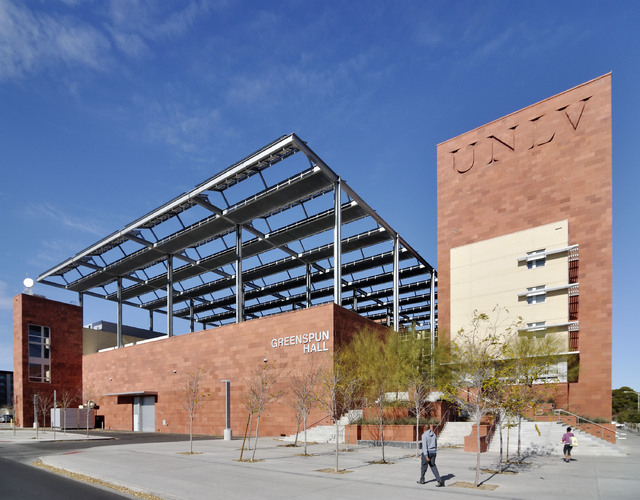UNLV rubs elbows with Ivy League schools when it comes to student yield

When it comes to student commitment, UNLV is in good company.
U.S. News &World Report ranked UNLV among the top universities by yield in its recently released 2014 report, meaning a high number of students who are accepted also enroll.
Two hundred sixty-four universities were ranked in the yield report.
Based on fall 2012 enrollment, Massachusetts’ Harvard University ranked No. 1 with a yield of 80.2 percent; Brigham Young University in Provo, Utah, ranked second with a yield of 80.1 percent; and UNLV ranked 11th. The universities have acceptance rates of 6 percent, 54.6 percent and 88.2 percent, respectively.
Of the 5,133 prospective UNLV students accepted for fall 2012, 3,294 enrolled — a yield of 64.2 percent, up from 60.5 percent the previous year.
It’s the fourth consecutive year UNLV has appeared in the category, up from 12th in the 2013 and 2012 reports, and 25th in 2011.
The ranking places UNLV among schools such as California’s Stanford University, ranked fifth; the Massachusetts Institute of Technology, ranked sixth; Connecticut’s Yale University, ranked seventh; and New Jersey’s Princeton University, ranked 10th.
At BYU, spokesman Todd Hollingshead said students are drawn to the school’s Church of Jesus Christ of Latter-day Saints affiliation.
“When students apply to BYU, it’s often the only university they apply to,” Hollingshead said Wednesday. “When they get accepted, they end up enrolling because this is one of their goals all along.”
UNLV officials attribute high yield to accessibility, financially and educationally, as well as a welcoming environment.
Full-time tuition for 2013-2014 is $6,570 for residents and $20,480 for nonresidents.
Nevada residents accounted for 82.3 percent of UNLV’s fall 2012 freshmen class. In 2013, that population grew to 83.4 percent, with about 76 percent from Clark County.
The freshmen retention rate in 2012 was 76.3 percent, and the six-year graduation rate was 41.3 percent. For 2013, numbers increased slightly to 77.3 and 42.9 percents, respectively.
The university’s overall ranking was not published. U.S. News publishes rankings of the top 75 percent of schools in each of the report’s categories. Remaining schools are designated Tier Two and listed alphabetically.
Two hundred seventy universities were ranked for overall quality in the “best colleges” category. The University of Nevada, Reno is ranked 181 out of 201. Some schools tie for rankings. UNLV did not make the top 75 percent cutoff.
Carl Reiber, vice provost for academic affairs, says undergraduate access to professors, diversity of student body and a holistic perspective attract prospective students.
“While we’re a research university, we’ve always embraced undergraduate education in a very passionate way,” Reiber said Tuesday.
At universities such as Stanford or the University of California, Los Angeles, he said, undergraduate students might not see a professor for semesters and are instead taught by postdoctoral and graduate students.
Reiber, who is a life sciences professor, said undergraduate students aren’t just cleaning labs at UNLV; they’re doing work alongside techs and graduate students.
Diversity is another distinguishing factor.
The U.S. Department of Education has designated UNLV a minority serving institution, and for the 2012-2013 school year it shared a third-best U.S. News campus ethnic diversity ranking with two schools.
“If you choose a university that’s predominantly white and you’re not white, you may feel a little discomfort,” Reiber said. “We reflect our community makeup in a very positive way.”
Reiber also said students appreciate the campus’ amenities and are proud of athletics and top-ranking academic programs such as hospitality and film.
Carrie Trentham, interim director of admissions, credits UNLV’s recruitment efforts, improved student and parent orientations, scholarships and affordability.
“Our number of offerings, in terms of academic programs, are the same or maybe even slightly less because there were some programs that were cut during 2008,” Trentham said. “I think programs are doing a better job of telling their stories and making students know what opportunities are available to them.”
Admissions counselors travel to schools locally, hosting college and financial aid nights. Senior presentations start in September, and one-on-one interviews are offered. Follow-ups begin in spring and juniors also are addressed.
This year, the school established UNLV on Display, in which faculty and students showcase their programs to students who would be less likely to visit campus.
UNLV’s largest nonresident populations come from California, Hawaii, Washington, Colorado and Arizona.
The university has a representative travel to Hawaii to coach students through the admissions process and ensure parents their children won’t get lost on the mainland.
UNLV also said it boasts fast application processing times and earlier financial aid award notifications.
Millennium Scholarships are awarded to many Nevada students and programs such as the Western Undergraduate Exchange and Rebel Challenge Scholarship are in place to reduce costs for out-of-state students.
In some cases, the discounts make it cheaper for nonresident students to attend UNLV than schools in their states.
At Spalding University in Louisville, Ky., dean of enrollment management Chris Hart credits his school’s third-place yield ranking with the city’s downtown’s resurgence, proximity to students’ homes and the university’s 55,000 degrees scholarship program, which seeks to create a “college-going culture.”
Spalding had a fall 2012 enrollment of 200 freshmen.
Mike Sfraga, vice chancellor at University of Alaska Fairbanks, which ranks fourth for yield, said the school’s unique arctic location, robust admissions and depth and breadth of science, technology, engineering and mathematics programs provide built-in affinity for the school.
“If you like Outside magazine,” he said, “you’ll love us.”
Contact reporter Kristy Totten at ktotten@reviewjournal.com or 702-477-3809. Follow @kristy_tea on Twitter.












